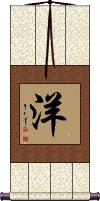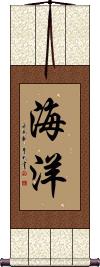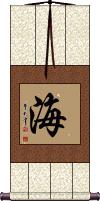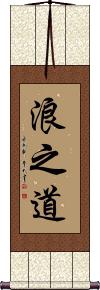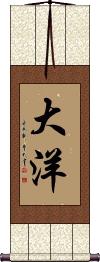Many custom options...
And formats...

Ocean in Chinese / Japanese...
Buy an Ocean calligraphy wall scroll here!
Personalize your custom “Ocean” project by clicking the button next to your favorite “Ocean” title below...
Ocean
Surname
Ocean
This is the Chinese and old Korean Hanja word for ocean. This can be pronounced in Japanese, and has the same meaning but is rarely seen alone in Japanese.
Besides ocean or sea, this character can also mean foreign, wide, or vast.
It's more common for Chinese people to use a different word “hai” for ocean or sea.
Ocean
海洋 is probably the most common word for “ocean” in Japanese. 海洋 is also sometimes used in Chinese and Korean Hanja.
In Japan, this can also be a female given name when pronounced as Miyou or Unami.
Ocean / Sea
海 is the character often used for sea or ocean in Chinese, Japanese Kanji, and old Korean Hanja. In some context, this can refer to the beach, or an area near the sea, such as “Shanghai” (same hai is the second character of Shanghai).
If you are looking for a universal word for ocean or sea - or can't decide which character for ocean or sea that you want, pick this one!
海 is also a common female given name in Japan - also a good name for a restaurant as “Umi Sushi” would mean “Ocean Sushi Restaurant.”
![]() Please note that our Japanese master calligrapher will tend to write this character in the form shown to the right (a line instead of two dots). Both versions are correct, and can be read in either language. Let us know if you have a preference when you order.
Please note that our Japanese master calligrapher will tend to write this character in the form shown to the right (a line instead of two dots). Both versions are correct, and can be read in either language. Let us know if you have a preference when you order.
The Way of the Wave
The Tao of the Waves
Great Sea
This is a rarely-used word for ocean in Japanese, Chinese, and Korean. This is here mostly for reference - please order a different ocean for your custom calligraphy wall scroll.
The first character means “big” or “great.”
The second means “ocean” or “body of water” (it can sometimes mean “foreign” but not in this case).
The first character designates that you are talking about a great or huge body of water (certainly a major ocean and not a smaller sea).
The Sea of Knowledge Has No Limits
學海無涯 is a Chinese proverb that reads, “sea of learning, no horizon.”
Colloquially, it means there are no limits to what one still has left to learn.
This would be the Chinese equivalent to the quote from Hippocrates, “ars longa, vita brevis,” meaning “it takes a long time to acquire and perfect one's expertise.”
See Also: Learning is Eternal
Not the results for ocean that you were looking for?
Below are some entries from our dictionary that may match your ocean search...
| Characters If shown, 2nd row is Simp. Chinese |
Pronunciation Romanization |
Simple Dictionary Definition |
洋 see styles |
yáng yang2 yang youji / yoji ようじ |
More info & calligraphy: Ocean(1) Occident and Orient (esp. the Occident); (2) ocean; sea; (prefix) (3) foreign; Western; European; (personal name) Yōji |
海 see styles |
hǎi hai3 hai umi(p); mi(ok); wata(ok); wada(ok) うみ(P); み(ok); わた(ok); わだ(ok) |
More info & calligraphy: Ocean / Seasea; ocean; waters; (male given name) Wataru sāgara, the ocean, the sea. |
大洋 see styles |
dà yáng da4 yang2 ta yang motohiro もとひろ |
More info & calligraphy: Great Sea(noun - becomes adjective with の) ocean; (personal name) Motohiro |
斐濟 斐济 see styles |
fěi jì fei3 ji4 fei chi |
More info & calligraphy: Fiji |
法門 法门 see styles |
fǎ mén fa3 men2 fa men houmon / homon ほうもん |
More info & calligraphy: Dharma Gate{Buddh} Buddhist law; Buddhist teaching dharmaparyāya. The doctrines, or wisdom of Buddha regarded as the door to enlightenment. A method. Any sect. As the living have 84,000 delusions, so the Buddha provides 84,000 methods法門of dealing with them. Hence the法門海 ocean of Buddha's methods. |
海德 see styles |
hǎi dé hai3 de2 hai te kaitoku |
More info & calligraphy: HeidThe eight virtues, or powers of the ocean, i.e. vastness, tidal regularity, throwing out of the dead, containing the seven kinds of pearls, absorption of all rivers, of all rain without increase, holding the most mighty fish, universal unvarying saltness. |
海洋 see styles |
hǎi yáng hai3 yang2 hai yang kaiyou / kaiyo かいよう |
More info & calligraphy: Oceanocean; sea; (female given name) Miyou |
阿修羅 阿修罗 see styles |
ā xiū luó a1 xiu1 luo2 a hsiu lo ashura; asura あしゅら; あすら |
More info & calligraphy: Frightful Demon / Asura{Buddh} Asura; demigod; anti-god; titan; demigods that fight the Devas (gods) in Hindu mythology; (female given name) Ashura asura, 修羅 originally meaning a spirit, spirits, or even the gods, it generally indicates titanic demons, enemies of the gods, with whom, especially Indra, they wage constant war. They are defined as 'not devas', and 'ugly', and 'without wine'. Other forms are 阿須羅 (or 阿蘇羅, or 阿素羅); 阿修倫 (or羅須倫 or 阿修輪 or 羅須輪); 阿素洛; 阿差. Four classes are named according to their manner of rebirth-egg, born, womb-born, transformation-born, and spawn- or water-born. Their abode is in the ocean, north of Sumeru, but certain of the weaker dwell in a western mountain cave. They have realms, rulers, and palaces, as have the devas. The 阿修羅道 is one of the six gatis, or ways of reincarnation. The 修羅場 or 修羅巷 is the battlefield of the asuras against Indra. The 阿修羅琴 are their harps. |
ライナー see styles |
rainaa / raina ライナー |
More info & calligraphy: Reiner |
瓦努阿圖 瓦努阿图 see styles |
wǎ nǔ ā tú wa3 nu3 a1 tu2 wa nu a t`u wa nu a tu |
More info & calligraphy: Vanuatu |
洲 see styles |
zhōu zhou1 chou suzaki すざき |
continent; island in a river (archaism) mid-ocean sandbank; (surname) Suzaki An islet; a continent. |
滄 沧 see styles |
cāng cang1 ts`ang tsang sougai / sogai そうがい |
(bound form) (of water, esp. the ocean) deep blue-green; (literary) cold (given name) Sougai vast |
瀚 see styles |
hàn han4 han kan かん |
ocean; vastness (given name) Kan |
瀛 see styles |
yíng ying2 ying ei / e えい |
ocean (given name) Ei |
鑁 see styles |
wàn wan4 wan ban ばん |
(surname) Ban Translit. vaṃ, associated with water and the ocean; also, the embodiment of wisdom. |
中脊 see styles |
zhōng jǐ zhong1 ji3 chung chi |
mid-ocean ridge (geology) |
中遠 中远 see styles |
zhōng yuǎn zhong1 yuan3 chung yüan |
China Ocean Shipping Company (COSCO) (abbr. for 中國遠洋運輸|中国远洋运输[Zhong1 guo2 Yuan3 yang2 Yun4 shu1]) |
佛海 see styles |
fó hǎi fo2 hai3 fo hai bukkai |
Buddha's ocean, the realm of Buddha boundless as the sea. |
信海 see styles |
xìn hǎi xin4 hai3 hsin hai shinkai しんかい |
(given name) Shinkai The ocean of faith: the true virtue of the believing hear is vast and boundless as the ocean. |
劫海 see styles |
jié hǎi jie2 hai3 chieh hai kōkai |
The ocean of kalpas, i.e. their great number. |
南溟 see styles |
nanmei / nanme なんめい |
the southern ocean; (given name) Nanmei |
四喩 see styles |
sì yú si4 yu2 ssu yü shiyu |
The four metaphors (of infinity, etc. ): 山斤 the weight of all the mountains in pounds; 海 the drops in the ocean; 地塵 the atoms of dust in the earth; 空 界 the extent of space. |
圓海 圆海 see styles |
yuán hǎi yuan2 hai3 yüan hai enkai |
The all-embracing ocean, i.e. the perfection or power of the Tathāgata. |
墜海 坠海 see styles |
zhuì hǎi zhui4 hai3 chui hai |
to fall into the ocean; to crash into the ocean |
外洋 see styles |
gaiyou / gaiyo がいよう |
open sea; ocean |
外海 see styles |
wài hǎi wai4 hai3 wai hai gaikai; sotoumi / gaikai; sotomi がいかい; そとうみ |
offshore; open sea ocean; open sea; (surname) Tonogai The sea that surrounds the four world-continents. |
大海 see styles |
dà hǎi da4 hai3 ta hai honda ほんだ |
sea; ocean (1) ocean; large sea; (2) (おおうみ only) fabric pattern; (personal name) Honda mahāsamudra-sāgara 摩訶三母捺羅婆誐羅 The Ocean. |
如海 see styles |
rú hǎi ru2 hai3 ju hai kotomi ことみ |
(female given name) Kotomi to like the ocean |
寒流 see styles |
hán liú han2 liu2 han liu kanryuu / kanryu かんりゅう |
cold air current; cold ocean current; cold stream cold current |
山毫 see styles |
shān háo shan1 hao2 shan hao sangō |
Writing brushes as numerous as mountains, or as the trees on the mountains (and ink as vast as the ocean). |
Click here for more ocean results from our dictionary
The following table may be helpful for those studying Chinese or Japanese...
| Title | Characters | Romaji (Romanized Japanese) | Various forms of Romanized Chinese | |
| Ocean | 奧申 奥申 | ào shēn / ao4 shen1 / ao shen / aoshen | ||
| Ocean | 洋 | you / yo | yáng / yang2 / yang | |
| Ocean | 海洋 | kai you / kaiyou / kai yo | hǎi yáng / hai3 yang2 / hai yang / haiyang | |
| Ocean Sea | 海 | umi | hǎi / hai3 / hai | |
| The Way of the Wave | 浪之道 | làng zhī dào lang4 zhi1 dao4 lang zhi dao langzhidao | lang chih tao langchihtao |
|
| Great Sea | 大洋 | tai you / taiyou / tai yo | dà yáng / da4 yang2 / da yang / dayang | ta yang / tayang |
| The Sea of Knowledge Has No Limits | 學海無涯 学海无涯 | xué hǎi wú yá xue2 hai3 wu2 ya2 xue hai wu ya xuehaiwuya | hsüeh hai wu ya hsüehhaiwuya |
|
| In some entries above you will see that characters have different versions above and below a line. In these cases, the characters above the line are Traditional Chinese, while the ones below are Simplified Chinese. | ||||
Successful Chinese Character and Japanese Kanji calligraphy searches within the last few hours...

